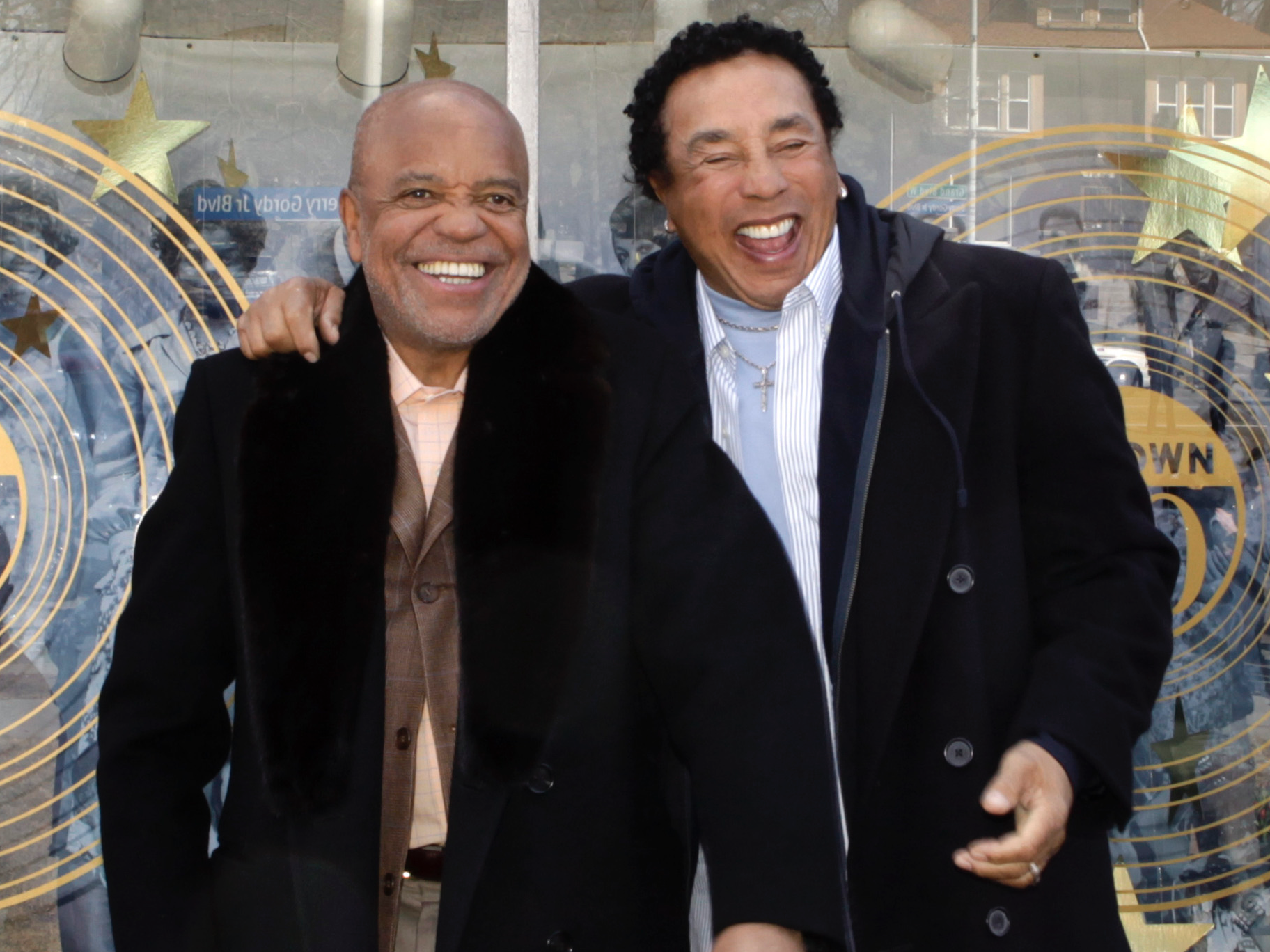The culture-shifting sensation that was Motown music began in January 1959, when Berry Gordy Jr. founded Tamla Records in Detroit, Michigan.
After Gordy incorporated the name “Motown Records” in 1960, the label and its subsidiaries would usher in the careers of a number of legendary artists, including Stevie Wonder, Marvin Gaye, and Diana Ross, along with decades of soul and R&B classics.
From its first major hit with Smokey Robinson & the Miracles’ “Shop Around” in 1960, Motown utilized a prolific “assembly line” approach to song production that Gordy said he adapted from working on the factory lines of Detroit’s automotive industry.
At “Hitsville U.S.A.,” the small Detroit home that served as the label’s studio throughout the 1960s, musicians and songwriters would circle in and out to collaborate on, and produce, hit records at a rapid pace. The company eventually moved to Los Angeles in 1972, which roughly coincided with artists like Wonder and Gaye breaking from the conventional “Motown sound” to produce innovative and influential concept albums.
After nearly three decades of immense commercial success, the label had financial difficulties toward the end of the 1980s, and an era ended when Gordy sold the label to MCA for $61 million in 1988. But the power of the company’s timeless music endures.
In honor of Black History Month, the following is a brief retrospective on Motown's 7 most essential artists and the contributions they've made to music:
Smokey Robinson & the Miracles

After becoming the first Motown act to break through to the mainstream, Smokey Robinson & the Miracles had a long stretch of hits through the 1960s and '70s.
"Shop Around," one of the group's first singles, became Motown's first platinum-selling record in 1960. The band's subsequent hits included "You've Really Got a Hold on Me" (1962), "The Tracks of My Tears" (1965), and the group's first No. 1 single, "The Tears of a Clown" (1970).
Robinson, whom Berry Gordy has called "the soul of Motown," was inducted into the Rock and Roll Hall of Fame as a solo artist in 1987. Controversially, Robinson's band members, the Miracles, were not inducted until 2012.
Stevie Wonder

In 1963, the 12-year-old prodigy "Little" Stevie Wonder (as Berry Gordy dubbed Stevland Morris) broke onto the national scene for Motown with his harmonica-infused No. 1 single, "Finger Tips, Part II."
A multi-instrumentalist genius, blind from infancy, Wonder would release a string of self-produced and commercially successful albums through the latter half of the 1960s. In 1971, he became the first Motown artist to negotiate a contract that allowed for complete artistic control of his music.
Through the '70s, starting with his 14th album "Music of My Mind," Wonder unleashed what critics have called "the greatest creative run" in the history of popular music. This run included five massively success, critically acclaimed LPs and two Billboard No. 1 albums - one of which, 1976's "Songs in the Key of Life," was certified diamond in the US for sales of more than 10 million copies.
Wonder was inducted into the Rock and Roll Hall of Fame in 1989.
The Supremes

Diana Ross and The Supremes were the most successful group or artist in Motown's history by at least one measure - their 12 Billboard No. 1 singles.
The trio's run of hits started with 1964's "Where Did Our Love Go" and stretched into the early 1970s. Ten of their twelve No. 1 hits, including "Baby Love" and "Stop! In the Name of Love," were written by the prolific Motown songwriting trio Holland-Dozier-Holland.
The Supremes were inducted into the Rock and Roll Hall of Fame in 1988, and Diana Ross also went on to have a successful solo career after releasing her debut, self-titled album in 1970.
Marvin Gaye

After working as a session drummer on a number of Motown's first hits, Marvin Gaye's solo career began in the early 1960s with a series of albums that largely covered jazz and pop standards.
Gaye scored his first original top 10 single with 1963's "Pride and Joy." He later found success in the mid-1960s through a series of duet albums with female Motown singers, most prominently with Tammi Terrell.
Following Stevie Wonder's lead, Gaye negotiated a new contract with Motown in 1971 for complete artistic control of his music. His resulting 1971 concept album, "What's Going On," told from the perspective of a Vietnam veteran returning to the US from the war, is widely considered one of the greatest albums of all time.
In 1984, in the manner of a Shakespearean tragedy, Gaye was shot and killed by his own father, two years after the release of his final and most commercially successful album, "Midnight Love."
Gaye was posthumously inducted into the Rock and Roll Hall of Fame in 1987.
The Temptations

The Temptations, a harmonizing Motown quintet notable for its many hits and tight dance choreography, have cycled through a large number of band members since they first hit the pop charts in the mid 1960s.
The group's biggest hit was also its second single released, 1964's No. 1 hit "My Girl." To date, The Temptations have thirty-seven top 40 hits to their credit, and they were inducted into the Rock and Roll Hall of Fame in 1989.
The band's most recent lead singer, Dennis Edwards, died this month at age 74.
The Four Tops

Led by singer Levi Stubbs, The Four Tops quartet signed to Motown in 1963 and found its break-through hit a year later, with 1964's "Baby I Need Your Loving."
The group had its best-selling hit with "Reach Out, I'll Be There," which hit No. 1 on the Billboard singles chart in 1966. The Four Tops left Motown in 1972 and released a series of hits on a handful of different labels throughout the '70s, only to resign with Motown in 1983.
They were inducted into the Rock and Roll Hall of Fame in 1990.
The Jackson 5

Five brothers hailing from Gary, Indiana, and lead by a young singer named Michael Jackson, The Jackson 5 signed to Motown in 1969.
The Jackson 5 become the first act in popular music history to reach No. 1 with their first four singles that charted on the Billboard top 40: "I Want You Back," "ABC," "The Love You Save," and "I'll Be There."
In 1976, the group's father and manager, Joe Jackson, moved the band from Motown to Epic Records. Michael Jackson's first four solo albums were released by Motown, but his subsequent world-stopping LPs, including 1982's "Thriller," the best-selling album of all time, were released by Epic.
The Jackson 5 were inducted into the Rock and Roll Hall of Fame in 1997, and Michael Jackson made it in 2001, eight years before he died in 2009.
For a full picture of Motown's decades of musical excellence, check out the Spotify playlist below:


